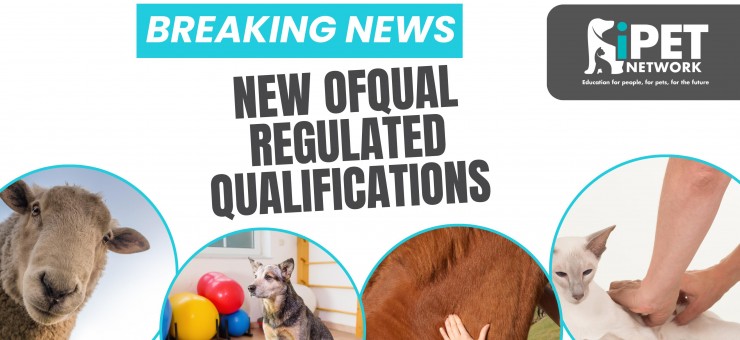
NEW QUALIFICATION LAUNCH // Veterinary Physiotherapy
iPET Network has launched three innovative new courses which will help aspiring veterinary physiotherapists and animal sports massage and rehabilitation therapists to get the qualifications in a brand new way.
Working with leading veterinary physiotherapist Wendy Vaughan, and of the Academy of Veterinary Physiotherapy, iPET Network is now offering a Level 6 Diploma in Veterinary Physiotherapy, a Level 5 Diploma in Animal Sports Massage and Rehabilitation and a Level 4 Diploma in Animal Sports Massage, all of which are regulated by Ofqual.
The degree equivalent Level 6 qualification is suitable for those currently working as a Veterinary Physiotherapist seeking formal recognition through a regulated qualification, as well as all of those who would like to work in this growth field, including existing dog groomers, equine grooms, hydrotherapists, trainers and massage practitioners.
These comprehensive qualifications are made up of practical and theoretical learning across a variety of animal species, with the practical elements focusing on the two main species of canines and equines, allowing learners to get recognition for their knowledge and practical skills in a vocational and friendly way.
Candidates will learn advanced study skills, personal development, professional development, resilience and wellbeing from people who have extensive experience of what it takes to be successful in the industry.
The blended learning, flexible and accessible courses will be delivered by Wendy and her team at The Academy of Veterinary Physiotherapy.
Wendy, who is a IRVAP, RAMP and AHPR registered therapist, said: "I am proud to have worked with iPET Network to develop this trio of qualifications, which will make these fields of veterinary science more accessible than ever, while maintaining all important best practice.
"It was important when we created the courses that they had a strong focus on animal health, behaviour and welfare, including exploring themes such as social licence to practice.
"There are also key specifics relating to the industry, legislation, regulation and working effectively as part of the multi-disciplinary team, as well as a real focus on anatomy and physiology and musculoskeletal anatomy, with particular focus on function, orthopaedics and neurology, biomechanics and locomotion and exercise physiology including how commonly used equipment effects our animals.
"The course then builds on this with a strong focus on exercise prescription and rehabilitation, including physiotherapy and rehabilitation for post-surgical, neurological, juvenile, geriatric, non-ambulatory and respiratory patients and for palliative and end of life care.
"For anyone wishing to qualify it is important to learn soft tissue pathology, injury, illness, disease and musculoskeletal dysfunction, concepts of pain, pain management and advanced concepts of tissue healing which are all covered in these qualifications.
"Building on a strong foundation of sports massage and soft tissue skills the courses then teach mobilisation techniques, and the safe and effective use of electro-physical agents (EPAs) and covers advanced clinical reasoning skills and how to conduct physiotherapy assessments and design effective and measurable treatment plans."
Upon completion of each level, candidates are eligible to register on the next higher qualification enabling study up to degree equivalent.
Sarah Mackay and Fern Gresty of iPET Network, said: "We are thrilled to be offering these high quality high level qualifications, which not only make these fields accessible to more learners, but ensure that high standards are at the forefront of the industries we support."
To find out more go to www.ipetnetwork.co.uk
